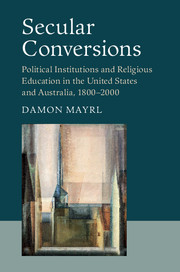 Secular Conversions
Secular Conversions Book contents
- Frontmatter
- Contents
- List of Figures and Tables
- Acknowledgments
- List of Acronyms
- Introduction
- 1 Politics, Institutions, and Secularization
- Part I Forging the nineteenth-century settlement
- Part II The nineteenth-century settlement in transition
- Part III Forging the twentieth-century settlement
- Part IV Implications
- Epilogue: Toward a Twenty-First-Century Settlement?
- Index
1 - Politics, Institutions, and Secularization
Published online by Cambridge University Press: 05 August 2016
- Frontmatter
- Contents
- List of Figures and Tables
- Acknowledgments
- List of Acronyms
- Introduction
- 1 Politics, Institutions, and Secularization
- Part I Forging the nineteenth-century settlement
- Part II The nineteenth-century settlement in transition
- Part III Forging the twentieth-century settlement
- Part IV Implications
- Epilogue: Toward a Twenty-First-Century Settlement?
- Index
Summary
INTRODUCTION
The United States poses significant problems for orthodox theories of secularization. While secularization theorists for years anticipated the inevitable demise of religion at the hands of modernization, religious pluralism, and scientific progress, the United States – a modern, religiously pluralistic, and scientifically advanced country if ever there was one – flummoxed their every prediction. In nearly every respect, relative to other modern, Western countries, it is saturated with religion: churches overflowing with congregants, sky-high rates of belief in God, and a public political culture that begins with prayer breakfasts between clergy and politicians, and ends with speeches ritualistically declaiming “God bless America!” “That the reigning theory [of secularization] does not seem to work has become an open secret,” confessed Stephen Warner en route to proclaiming a “new paradigm” for the study of religion that gave American developments pride of place.
Yet in at least one important respect, the United States does in fact approximate the predictions of sociology's classical secularization theorists. America's educational system is extremely – one might say resolutely – secular. In fact, it is secular even in comparison to those other modern, Western countries that otherwise cast America's religiousness in such high relief. Unlike nearly every other Western nation, religious exercises and religious instruction are excluded from American public schools. More striking still, the United States is virtually alone in refusing to provide public support for religious schools; even hypersecular France funds its system of Catholic schools. How did this paradoxical situation come to pass?
American anomalies are often explained by resorting to one American “exceptionalism” or another, yet in this case no obvious candidate suffices. Appeals to national culture might suggest that America's secular educational system reflects a longstanding desire to keep religion voluntary and separated from state support. But American education has not always been so secular. In fact, for most of American history, religious instruction and devotional exercises held a prominent place in American public schools, and it is only since the 1960s that religion and education have experienced such a total divorce. Others have suggested that America's unusual religious diversity required it to adopt “a school system which keeps religious plurality out.” America's high degree of religious pluralism has certainly contributed to considerable contestation over the relationship between religion and education.
Information
- Type
- Chapter
- Information
- Secular ConversionsPolitical Institutions and Religious Education in the United States and Australia, 1800–2000, pp. 11 - 38Publisher: Cambridge University PressPrint publication year: 2016